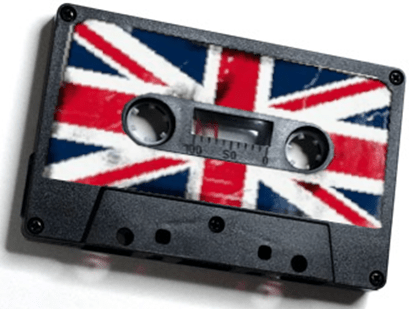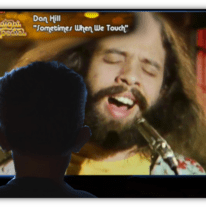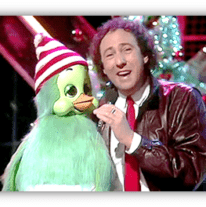Another in an occasional series focusing on the one hit wonders.
Or to put it another way: The one hit blunders: Acts that stormed the Billboard Hot 100 one time only, before being unfairly discarded by America.
Meaning: You in the States missed out on rich and diverse back catalogues.
Up today:
Madness
The UK Chart Record:

- Singles: 31 top 40: Including 18 Top 10 & One Number 1
- Albums: 22 top 40: Including 12 Top 10 and Three #1
Was there ever a band more aptly named than Madness?
At first glance, they got it spot on.

But the name and the image can obscure the depth to their work. It wasn’t all dressing up in costumes, flying saxophonists and the nutty train.
There’s a phrase here: National Treasure:

Used to describe a person or collective with a lengthy and acclaimed career that has gained a place in the nations affections.

Madness fit that criteria.
There was a real sense of them being a gang. Unlike Dexys from last time out, this time its real.
They assembled from around North London as teenagers, centering on Camden.
There was a mix of backgrounds from working class kids with a sideline in petty crime to middle class bohemian families.

Making waves before they became known for their music, Mike Barson and Lee Thompson were prolific graffiti artists with their tags appearing across north London.
The band formed in 1976 with a nucleus of Lee ‘Kix’ Thompson (saxophone), Mike ‘Monsieur Barso’ Barson (piano) and Chris ‘Chrissy Boy’ Foreman (guitar).

After various coming and goings by 1978 they were almost complete.
Now a sextet progressing from being North London Invaders to Madness with Mark ‘Bedders’ Bedford (bass), Dan ‘Woody’ Woodgate (drums) and Graham ‘Suggs’ McPherson (vocals).
The final member; Cathal Smyth but at the time going by Chas Smash, initially featured as dancer and compere (its his booming voice introducing One Step Beyond).

By the second album he was a full time member, taking occasional lead vocals, backing vocals and trumpet.
The nicknames would gradually recede with the exception of Suggs.

He was Suggs before he met the others and has remained so.
1979s debut single “The Prince,” inspired by Ska singer Prince Buster, landed at #16.
With their second single they were in the top 10. 15 of their first 17 singles would land there. 10 of those were top five with one reaching the summit. They were the most successful singles band on the UK charts in the first half of the 80s.
Their one US hit, “Our House,” is reflective of their output.

Songs as slice of life character studies, that were relatable and used humour and melancholy side by side. Plus insanely catchy choruses.

They took full advantage of the burgeoning video age, always willing to dress up in costume, they played up the comic element.
It appealed to the young and young at heart.
If that looks like plain sailing: there was a darkness that could have derailed them just as they got going.
“The Prince” was released on 2-Tone. They took part in the 1979 2-Tone tour with The Specials and Selecter. All the bands had a strong Ska influence.

But being from London, Madness were outliers, rather than West Midlands. And the only all-white act on the bill.
They were all inspired by the clothes of Jamaican rudeboys and the Mod and Skinhead subcultures of 1960s Britain.
Whereas The Specials were politically aware, vocally anti-racist and promoted inclusivity not all Skinheads followed their lead. Despite venerating the music of Jamaica there was an element who were prominent in supporting racist organisations;

The National Front and The British Movement.
The late 70s were a febrile time and these organisations looked for a while like they could break through into mainstream politics.
Madness were a magnet for the racist element. Other 2-Tone bands were vocal in what they stood for and against. Whereas Madness tried to tread a fine line of apolotical impartiality.

They wanted to concentrate on entertainment.
The danger of this approach was brought into focus by an NME profile conducted during the 2-Tone tour in which Chas Smash professed a view that was naive at best:

“We don’t care if people are in the NF, as long as they’re having a good time”
A view that the journalist leapt on and the rest of the band quickly disassociated themselves from. A view that nonetheless would be used against them early in their career.
The reticence to explicitly condemn this element was based in part on the experience of punk band Sham 69 a year earlier.
They attracted National Front followers despite being active in the Rock Against Racism movement and vocally anti-racist.

A number of shows ended in violence as that tinderbox ignited and they were forced to stop playing live.
As the statement was brought up again and again, they stated their personal distaste for racism and they did begin to speak out at shows and rid themselves of this element.
Having started out apolitical, that did change.
Over the years they played benefit shows in aid of the homeless, unemployed, Greenpeace and Artists Against Apartheid.

The final single of their initial run, 1986’s “(Waiting For) The Ghost Train” was an anti-apartheid song.
Their name and the videos can takeaway from the fact they tackle serious subjects.
Even on debut album; One Step Beyond, the track “Land Of Hope And Glory” was written by Lee Thompson about his experiences in borstal (juvenile prison). It didn’t sound like a fun experience but at the same time their presentation made the song sound a lot of fun.
Whereas “Embarrassment,” from follow up album; Absolutely, was delivered in a much more straightforward manner.

Also written by Thompson, it was a defence of his sister facing judgement for getting pregnant while not married and to a black man.
Its still a huge earworm and the serious tone didn’t hurt its performance. A sign that they weren’t just tied to the image.
They were able to bridge the silly and the serious.
Their #1 single “House of Fun” was about coming of age and the embarrassment of trying to buy condoms.

A relatable subject for young male fans but one that wasn’t really spoken about.
An attitude of not taking things too seriously was demonstrated by their Top of the Pops appearances.

They were ideal for the show and were featured plenty of times.
It could have been even more, but the long boring process of rehearsing and filming the show led to them spending the day in the bar and creating chaos rather than focusing on the job in hand. They claimed to have been banned from the show on four occasions.
Then there was the time they used the police uniforms they obtained for the “Shut Up” video to stage a police raid on The Clash who were rehearsing nearby.

A raid that the Madness boys said led to a lot of drugs being flushed down the toilet in panic.
And a very pissed off Clash when they realised who the police were.
I can’t say its unique to Madness, but to have a seven-piece band with the writing spread throughout is definitely unusual.
Songs were generally written solely or in pairs. Every member has a credit on a top 10 single. While writing duties were divided across the seven, the most prominent was Mike Barson.
It was also Mike who was first man out.

By 1984 he had moved to Amsterdam with his wife and had enough of the music business.
Coincidence or not, the top 10 hits dried up.
They’d already moved away from ska after One Step Beyond. But over time, the sound matured, and a melancholic air took hold on the likes of “One Better Day” and “Yesterday’s Men.” Even when they threw out “Uncle Sam:“

Catchy as hell and with full nutty vibe, it stuck at #21.
In mid 1986 work started on what should have been their 7th album. But that old chestnut of “musical differences” got in the way.
Rather than an album, Madness announced there would be one last single: “Ghost Train” And it was all over. Even Mike came back into the fold for its recording.
Except it wasn’t the end. After a short break Suggs, Smyth, Foreman and Thompson were back.

But to differentiate them from the past they were now The Madness.
Woodgate meanwhile would enjoy chart success as drummer for Voice Of The Beehive. An album and two singles came out in 1988 but for the first time they missed the Top 40.
The end? Again: only a temporary cessation.
Divine Madness was released in 1992.

Their first career spanning compilation became a triple platinum #1.
An accompanying re-release of It Must Be Love put them back in the top 10 of the singles chart.
It was apparent there was a lot of love for Madness.
Giving the people what they want they held their own festival in London’s Finsbury Park:

Madstock!
The one day event became a two day event due to demand, resulting in them performing to 75,000 over the weekend. The event reached legendary status thanks to residents of a nearby tower block reporting an earthquake and necessitating an evacuation as the combined stomping of tens of thousands of fans created a wave of tremors.

Through the 90s there would be annual Christmas tours and three more Madstock!s.
The creative itch finally kicked back in at the end of the decade.
1999s Wonderland produced the firm fan favourite and final top 10 single, “Lovestruck.” A love song in typical Madness style as the effects of too much alcohol have the protagonist falling for a lamppost.
However, the other singles and album underperformed and the band retreated back into the safety of live shows, the back catalogue,

And the old standby of a covers album.
It looked like a band in slow decline, resting on their laurels and embracing heritage status. At which point they pulled off their greatest trick.
The most acclaimed album of their career; The Liberty Of Norton Folgate in 2009.

Their longest, most diverse, richly textured release. A concept album dedicated to London.
Madness will always be seen as a singles band. Its understandable.
They’ve had three #1 albums and two of those are compilations. The Liberty Of Norton Folgate marked a shift in focus to albums though it did spawn their final top 40 entry in “NW5”, the postcode of Camden.

The area of London that is the centre of their universe.
Since then there have been another three studio albums, the last in 2023. In my opinion each of them are as essential as the lauded work of the original iteration.
There have been comings and goings, too.
For much of the 21st Century they’ve been a six piece. Foreman spent a couple of years away then Bedford did the same. Finally Cathal Smyth departed in 2014 and has stayed out.

They’re still on the road every year, playing to a devoted and substantial fanbase.
To quote the Prince Buster song they took their name from and covered;
“Well, if this is madness?”

“Then I know I’m filled with gladness”






Great article as always, JJ! Do you have anything to say about the West End musical based on the group’s catalogue, by the way?
Thanks Ozmoe. I haven’t seen the musical, so can’t comment on how good (or otherwise) it is.
On the face of it, its should have done a lot better than it did. Lasted 10 months in the West End before poor ticket sales saw it pulled. That was despite winning an award for best new musical and having a show full of well loved songs. There have been occasional performances and tours since then but seems it was last performed in 2017.
Possible that Madness fans just aren’t theater types. I think it launched at a time when there were a lot of jukebox musicals around so may also be that the competition killed it.
I enjoyed reading about this band. When Tom was covering the early 80s, v-dog and some of the commenters from across the pond (which likely included you) gushed enough about Madness to warrant a deeper dive of their U.K. hits and I liked what I heard. So many U.K. bands filled up the charts here, but the ska bands with horns and such did not catch on in the mainstream like the synth-dominated groups. Ska was more the territory of the cool kids (such as my sister) that dug deeper than the radio. That would change dramatically in a few years with the 3rd wave of ska, which exploded here, but earlier groups like Madness and The Specials never quite got their due in the U.S. The Police were probably the closest thing to a ska band that hit here at the time, but they were promoted here more, and even then, it took 3 albums for them to enter the general conversation.
I sang “Our House” at karaoke once, but the part where they sing really fast tongue-tied me, even though I practiced it. I won’t be trying it again.
Thanks rb!
I know the part of Our House you mean and you’re a braver man than me to try it.
I imagine that part has sunk many an unsuspecting karaoke singer who embarks on Our House based on the catchy choruses.
Madness did tour America a number of times before Our House. They even appeared on American Bandstand in 1980 but they may have been too different at that point to catch on.
https://youtu.be/zVknir2mZQU?feature=shared
I’m don’t remember gushing about them but it sounds like something I would do. They may be just a tad too British to fit in over here but, man, they made some great music. They had me hooked from, “Hey you, don’t watch dat, watch dis!”
Another good entry, JJ. Keep ’em coming!
The next entry is already written, the one hit wonder supreme in comparison to their success here. No more clues, you’ll have to wait. Might just be a little while as got something else prepared on another topic to submit first.
I admit that I haven’t heard much of their catalogue, because I first knew “One Step Beyond” in a compilation album in early 90’s, and later in the decade “Our House” while I used to watch “MTV Clásico” on MTV Latino.
And in the mid 90’s I heard a lot on the radio the Suggs’ cover version of “I’m Only Sleeping”, without knowing at the time who sang it.
https://youtu.be/m4nK_cCykOs?si=cvc3RFSgrSdki6vm
Suggs had quite the career outside Madness. TV presenting, radio work, managing and producing Liverpool band; The Farm in the early 90s, a bit of acting and his own solo career in the mid 90s that amounted to two albums.
He didn’t sound too different to Madness, had two big hits with covers of I’m Only Sleeping and Cecilia.
So “The Prince” is basically the ska “Geno” then?
Ha! I hadn’t spotted that. In a way it is.
Just with far more joy and generosity of spirit than Dexys who having declared that Geno inspired them back in the day declared that he was now all over and his song was so tame.
Madness would never disparage Prince Buster in that way.
I bought the wrong album. I bought the album without “Our House” on it. It was Keep Moving. It’s still an all-timer for me. Favorite deep track? “Victoria Gardens”. Judging by the Spotify stats, “Brand New Beat” isn’t part of the Madness canon either. Hard to beat “Our House”, but for me, “Michael Caine” comes close. Madness makes an appearance on the documentary The Go-Gos. Oh, wow. That was a revealing watch. No wonder they didn’t go ahead with the biographical film about them.
Victoria Gardens is great. The first Madness I bought was Utter Madness which collected the singles from the second half of their original incarnation. It included a couple of album tracks, I’ll Compete and Victoria Gardens. According to the liner notes VG was going to be a single, it was mixed and the artwork ready but they opted to release One Better Day instead. With the cover using the artwork already produced for VG.